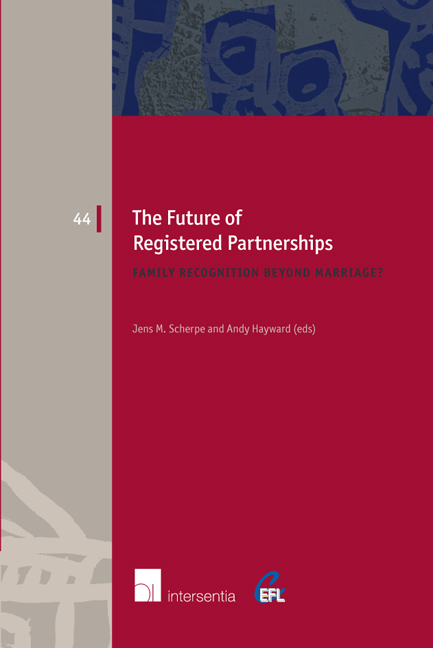Book contents
- Frontmatter
- Foreword
- Preface
- Contents
- List of Contributors
- The Future of Registered Partnerships: An Introduction
- Questionnaire
- Part I Registered Partnerships as a Functional Equivalent to Marriage
- Part II Registered Partnerships as an Alternative to Marriage
- Part III Registered Partnerships in a Time of Transition
- Part IV Alternative Models for Registered Partnerships: Beyond Conjugality, Beyond Formality
- Part V Registered Partnerships, Discrimination and Human Rights
- Part VI Comparative Perspective and Conclusions
- The Future of Civil Partnership in England and Wales
- The Past, Present and Future of Registered Partnerships
- Index
- European Family Law Series
The Past, Present and Future of Registered Partnerships
from Part VI - Comparative Perspective and Conclusions
Published online by Cambridge University Press: 22 September 2018
- Frontmatter
- Foreword
- Preface
- Contents
- List of Contributors
- The Future of Registered Partnerships: An Introduction
- Questionnaire
- Part I Registered Partnerships as a Functional Equivalent to Marriage
- Part II Registered Partnerships as an Alternative to Marriage
- Part III Registered Partnerships in a Time of Transition
- Part IV Alternative Models for Registered Partnerships: Beyond Conjugality, Beyond Formality
- Part V Registered Partnerships, Discrimination and Human Rights
- Part VI Comparative Perspective and Conclusions
- The Future of Civil Partnership in England and Wales
- The Past, Present and Future of Registered Partnerships
- Index
- European Family Law Series
Summary
THE EXTENSION OF ‘FAMILY’ AND THE NEED FOR RELATIONSHIP RECOGNITION
The perception of what ‘family’ is has changed dramatically over the centuries, and has been the subject of much learned debate. This debate cannot be repeated here, but even for those who are focused on ‘contemporary family law’, it is well worth engaging with the seminal texts on this, and particularly those by John Eekelaar, Katherine O'Donovan, Richard Collier, John Dewar and Ulrich Beck/Elisabeth Beck-Gernsheim, as well as the legal-historical accounts by Stephen Cretney, Rebecca Probert and Masha Antokolskaia. But in no period of time have the changes in family law been quite as dramatic and radical as since the middle of the last century. Until then, marriage had been the sole focal point of family law, and family outside of marriage, regardless of the law, ignored (at best) or even condemned, and (at worst) subject to criminal prosecution. Social changes and the resulting political pressures led to legal changes in almost all areas of family law, sometimes triggered by court decisions, sometimes by parliamentary law reform, and sometimes even by public referendum. As public perceptions of acceptable family forms and family relations changed, so did the law – albeit at a much slower pace. Needless to say, this is an ongoing process and will continue to be so.
This volume, and therefore this chapter, focuses on the recognition of adult relationships in general and on the formalised recognition of such relationships in particular. As living together without being married became socially acceptable and the number of such couples increased significantly, many jurisdictions felt that the problems that these couples faced, particularly (but not exclusively) in case of separation or death, needed to be addressed by specific legislation rather than piecemeal jurisprudence. Marriage, as the only existing formalised form of living together, was the inevitable comparator, particularly when the couples in question were of the opposite sex and, in many cases, had joint children. But these of course were not the only couples living together without being married: same-sex couples, to whom a formal recognition of the relationship was denied, faced very similar legal issues – but without even the possibility to resolve them by entering into a marriage. As social acceptance of homosexuality and same-sex relationships increased, providing a legal basis for such relationships became a pressing social and legal issue.
- Type
- Chapter
- Information
- The Future of Registered PartnershipsFamily Recognition Beyond Marriage?, pp. 561 - 586Publisher: IntersentiaPrint publication year: 2017



